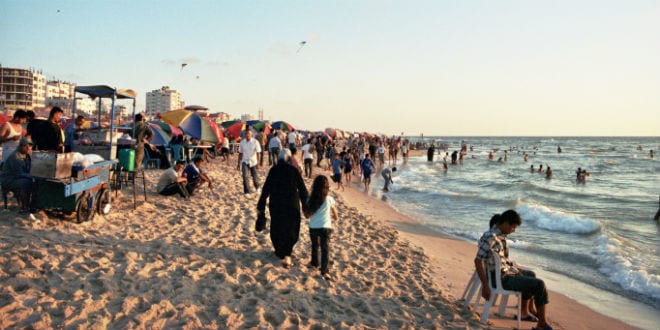Raw sewage from the Gaza Strip is polluting the Mediterranean coastline, and its impact can be felt far afield, The Times of Israel reported. While fresh water supplies for Gaza residents are at greatest risk, water sources in Israel are beginning to see the effects of a problem that could spread across the sea if left unchecked.
Israel withdrew from the Gaza Strip in 2005, leaving the Palestinian enclave in the hands of the Palestinian Authority (PA). In 2007, terrorist group Hamas seized control of the Strip, using the region as a launchpad for terror against Israel and inviting repeated military responses. A combination of mismanagement, power disruptions and infrastructure damage from the conflict has crippled the sewage treatment system in Gaza, already sagging under the weight of a rapidly-growing population: 1.8 million people live there.
“It’s certain that Gaza Strip’s beaches are completely polluted and unsuitable for swimming and entertainment, especially in the summer,” said Ahmed Yaqoubi of the Palestinian Water Authority.
“We can say that 100 percent of the water is not potable,” he added. For years, Gaza has overdrawn on its underground water aquifer, allowing sea water and sewage to seep through and contaminate Gaza’s only source of drinking water.
Making the challenge even greater is the blockade maintained by both Israel and Egypt since 2007, established to limit Hamas, a group bent on Israel’s destruction, from developing the weapons and terror infrastructure it needs to inflict suffering on the Jewish State. Much of the building materials sent into Gaza are diverted towards building cross-border tunnels for smuggling or infiltration purposes.
To solve the problem, Israel would need to allow more building materials and electrical power to flow into the Gaza Strip, but such a move poses a security risk.
Foreign humanitarian groups are interested in helping. Steen Jorgensen, country director for the World Bank in the West Bank and Gaza Strip, said his company was moved by a fatal sewage flood in 2007 to build a $73 million sewage treatment plant. However, the plant, which could treat about one-fifth of Gaza’s sewage, is still inoperable due to power shortages. Israel supplies 125 to 140 megawatts of power a day to the Gaza Strip, but the region needs about 400, meaning they get only six to eight hours of power a day.
“That’s just not reliable enough for a sewage plant,” said Jorgensen. According to Jorgensen, foreign donors have offered to build a dedicated three-megawatt supply for the plant, but Israel is not prepared to allow it. Instead, the World Bank plans to operate the plant on diesel-fueled generators, a more expensive source of energy which is affected by fuel shortages. Still, it is better than waiting.
“If we don’t get this operational, then I think it’s going to be very hard to raise money for other necessary projects in Gaza,” Jorgensen said.
The World Bank plant is not the only one impacted by the power shortages. Another facility, rehabilitated by German state-owned development bank KfW to the tune of $20 million, can only run half days.
Another plant is slated for construction in August which could handle waste for up to 1 million residents, but it, too, is hampered by Israeli security restrictions.
Meanwhile, Israel is beginning to see the impact of the Gaza pollution crisis. In Ashkelon, about 10 kilometers (6 miles) north of Gaza, a water desalination plant was shut down for two months earlier this year “because of the quality of the raw water,” according to Israeli Water Authority spokeswoman Ilana Keren. While she would not elaborate on the reasons for the poor water quality, Gidon Bromberg, the Israeli director of the environmental group EcoPeace Middle East, said “there’s no doubt” it was waste from Gaza. “There’s no other source,” he said.
Additionally, Bromberg noted, cholera, typhoid or other pandemic diseases could easily cross into Israel via the shared underground aquifer and the sea.
“It’s a single shared bathtub,” Bromberg said. “There’s 101 different ways for these bacterium to be transferred.”
The Bible tells us that God gave us a beautiful world and made us responsible for its upkeep. It appears Gaza is failing to meet that responsibility.



